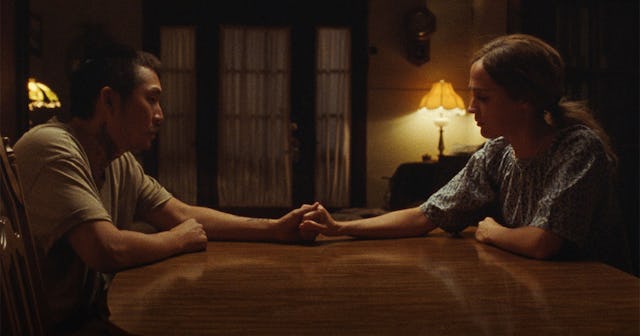'Blue Bayou' Is Both Infuriating And Heartbreaking

Some movies — despite the onscreen trauma — leave the audience uplifted and inspired, ready to take on the world and be the change they want to see. ‘Blue Bayou’ (Focus Features, September 17, 2021) is not one of those movies. Suffice to say, if the film trailer doesn’t clue you in on the tone and tenor of this Justin Chon-helmed deportation movie, then I don’t know how to help you.
Written and directed by Korean American Chon, ‘Blue Bayou’ was an official selection of the 2021 Cannes Film Festival and is a provocative and timely story of an American family fighting for their future. The movie follows Antonio LeBlanc (Chon), a transracial and transnational Korean adoptee raised in a small town in the Louisiana bayou, who is married to pregnant wife Kathy (Alicia Vikander) and step-dad to their precious daughter Jessie (Sydney Kowalske). Desperate to cobble together a better life for his family, Antonio must confront his troubled past when he discovers that he could be deported from the only country he has ever known.
Justin Chon deftly interweaves multiple stories of family separation
Without giving too much away, ‘Blue Bayou’ plays with the themes of family separation, abandonment, and how our traumas inform, incept, and interact with our circumstances. From Antonio’s memories of his mother and his past, to Jessie’s estrangement from her biological father Ace (Mark O’Brien) and his desire to re-establish their relationship, to Kathy’s mother treating Antonio like garbage, to one of Antonio’s client’s refugee story, ‘Blue Bayou’ effectively illustrates the aftermath of sundered families and their emotional injuries.
Excellently acted and directed, the film pissed me off — hopefully in the way the award-winning writer/director Chon intended. This was only possible because the cast is solid and the characters feel like real people. They worm their way inside your heart — even when you guard yourself because you accurately anticipate your heart shattering. Antonio is impossible not to root for — even through his multitude of bad and then worse decisions.
Focus Features
And when I tell you the amount of contempt I feel for Ace — and even Kathy (though I find her much more sympathetic) — I really cannot overemphasize how the white folks just continued to disappoint despite me knowing full well this is how the world works. I’m so exhausted of cowardly white men and their moral quandaries and conflicted white women and their white savior complex and feelings.
This movie made me hate people — and white supremacy and ICE and classism and patriarchy and the casual indignities everyone in the movie suffered. (So, basically, no more or less than the typical news cycle.)
‘Blue Bayou’ is painfully human
The beauty of ‘Blue Bayou’ is that there is no shining paragon of immigrant virtue or patient suffering. There are only flawed and broken people trying to make the best go of their lives.
The movie parades a veritable buffet of suffering that is, at times, overwhelming. What is particularly painful is the knowledge that the portrayed stories resemble the real stories of people I personally know. That all this pain exists in this world — and it’s not fake.
It exists. And in specific, the threat of deportation for international adoptees is real.
Focus Features
According to the National Council for Adoption and other organizations, approximately 15,000 to 18,000 adults who were adopted by U.S. citizens when they were children do not have U.S. citizenship despite living their whole lives here under the impression that they were full citizens. It is unclear the actual number because the federal government doesn’t track whether adoptees become naturalized citizens.
And though I wished at times it were a different genre of movie — you know, the Disney kind where after much suffering, there is a satisfactory moment where love triumphs over all — ‘Blue Bayou’ served its purpose.
Don’t get me wrong. The film also shows love — in all its glory and shit; there is so much love that it hurts.
Love is not enough
But love is not enough. Love can spur action, but alone it is just sentiment. ‘Blue Bayou’ highlights the unjust and failing systems in a deeply personal story to make us care — to make us love Antonio and the people he loves — in the hope that we will be angry enough, and yes, love enough to act.
This article was originally published on